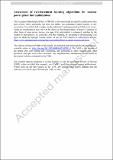Assessment of reinforcement learning algorithms for nuclear power plant fuel optimization
Author(s)
Seurin, Paul; Shirvan, Koroush
Download10489_2023_5013_ReferencePDF.pdf (21.54Mb)
Open Access Policy
Open Access Policy
Creative Commons Attribution-Noncommercial-Share Alike
Terms of use
Metadata
Show full item recordAbstract
The nuclear fuel loading pattern optimization problem belongs to the class of large-scale combinatorial optimization. It is also characterized by multiple objectives and constraints, which makes it impossible to solve explicitly. Stochastic optimization methodologies including Genetic Algorithms and Simulated Annealing are used by different nuclear utilities and vendors but hand-designed solutions continue to be the prevalent method in the industry. To improve the state-of-the-art, Deep Reinforcement Learning (RL), in particular, Proximal Policy Optimization is leveraged. This work presents a first-of-a-kind approach to utilize deep RL to solve the loading pattern problem and could be leveraged for any engineering design optimization. This paper is also to our knowledge the first to propose a study of the behavior of several hyper-parameters that influence the RL algorithm. The algorithm is highly dependent on multiple factors such as the shape of the objective function derived for the core design that behaves as a fudge factor that affects the stability of the learning. But also an exploration/exploitation trade-off that manifests through different parameters such as the number of loading patterns seen by the agents per episode, the number of samples collected before a policy update , and an entropy factor that increases the randomness of the policy during training. We found that RL must be applied similarly to a Gaussian Process in which the acquisition function is replaced by a parametrized policy. Then, once an initial set of hyper-parameters is found, reducing and until no more learning is observed will result in the highest sample efficiency robustly and stably. This resulted in an economic benefit of 535,000 - 642,000 $/year/plant. Future work must extend this research to multi-objective settings and comparing them to state-of-the-art implementation of stochastic optimization methods.
Date issued
2024-01-29Department
Massachusetts Institute of Technology. Department of Nuclear Science and EngineeringJournal
Applied Intelligence
Publisher
Springer US
Citation
Seurin, P., Shirvan, K. Assessment of reinforcement learning algorithms for nuclear power plant fuel optimization. Appl Intell 54, 2100–2135 (2024).
Version: Author's final manuscript